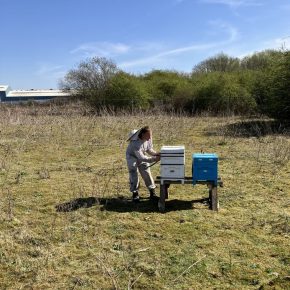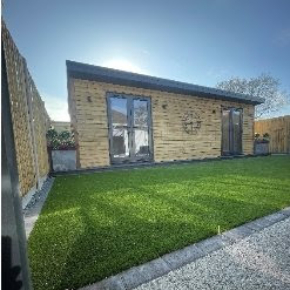
Does the Future Homes Standard really signify the end of gas boilers?
With the first instalment of the Future Homes Standard published, the Government are continues to mandate the end of all fossil fuel heating systems in all new homes by 2025. But what will that actually look like? And is this really the end of gas boilers as we know it? Simon Green, Managing Director of Green Building Design Consultants, who are leading specialists in low carbon building design, shares his thoughts on what the Future Homes Standard will really mean and his predictions for the future of gas.

Q: What does the future hold for the heating of buildings and fossil fuels?
A: The Future Homes Standard is looking to increase thermal performances above current standards. This will require low carbon heating solutions, better air tightness and reviews on ventilation, all of which will have a very big impact on how we design, think and live in new houses.
Although the full details are not yet known, the first instalment gives a good indication of what will be included in the standard when it is published in 2025.
In my personal opinion, I expect the standard to include increased measures for energy efficiency, with a focus on heating using low carbon systems such as ground or air source heat pumps.
Better air quality and reduced water usage could also be included, to help the UK work towards a more sustainable future. Gas heating, as it currently stands, will be non-compliant, so other alternatives are needed.
Q: The general rule of thumb of the Future Homes Standard is that from 2025, to install a gas boiler in a new home, PV panels on the roof will be a necessity. Have you witnessed an increase in demand for PV panels?
A: Many of our clients are requesting PV panels to be installed at their properties, and we have seen a steady rise in the number of installations over the last 12 months.
This is largely due to our clients wanting to be as carbon neutral as possible, however, some have expressed the need for PV panels as a pre-requisite to installing a gas boiler, where there are space constraints or other barriers to installing low carbon alternatives.
Q: So, is this the end of gas boilers as we know them?
A: Yes, it probably is. At the end of the day, gas boilers are a fossil fuel emitting carbon. Whilst huge strides are being made into the R&D of hydrogen boilers, which will be the only option for the diehards who will or cannot change to low carbon, I predict that the Government will begin adding large carbon taxes to gas, making it more expensive and a less attractive option.
Of course, the gas boiler will not disappear completely as some applications will still need them. Large and instant hot water loads are tricky to heat and store with low energy, and very small properties simply do not have the required space for new water tanks and heat pumps.
Q: With such change afoot, how can individuals and companies prepare?
A: Here at Green Building Design Consultants, we are talking to and educating our clients on the changes that are coming.
In addition, we are transparent about some of the common pitfalls with low energy solutions, allowing people to understand how best to heat their homes efficiently, whilst reducing their carbon footprint.
It is not a one solution fits all, with many factors for individual homes needing to be taken into account, to ensure the most appropriate low carbon heating system is installed to meet specific restrictions and requirements.
Q: As we approach the end of 2020, the regulations are getting ever closer – so what does Green Building Design Consultants predict for the future?
A: We see gas boilers generally being replaced with heat pumps, but the Government needs to help with the cost of installation and offer ways to make it cheaper to incentivise people to switch.
They have already announced the Green Homes Grant, which comes into force at the end of this month, providing financial help for individuals to make energy efficient improvements to their home, including installing low-carbon heating.
However, more support will be needed to help people afford the changes and alter their mind-set towards heating their homes.
Q: So is it really the end for gas?
A: We predict that gas is going to cost a lot more in the future and will be subject to large green carbon taxes, however, we cannot underestimate the work being done into the feasibility of hydrogen gas boilers.
We have witnessed the de-carbonisation of electricity over the last decade, and it is possible that gas will follow suit, using hydrogen as a ‘greener’ gas to fit with the planned targets.
On the whole though, we believe this signifies the end of gas as a primary fuel source. As individuals, we are all much more aware of our carbon production and the impact on the environment, and there is an appetite for us all to play our part in creating a more sustainable future.
Latest news

30th April 2025
Digital Construction Week announces seminar programme for its landmark 10th edition
Digital Construction Week (DCW) returns to ExCeL London on 4 – 5 June 2025 with its most impactful programme yet. It brings together the best and brightest from across AECO, for two days of practical learning and idea sharing.
Posted in Articles, Building Industry Events, Building Industry News, Building Products & Structures, Building Services, Building Systems, Exhibitions and Conferences, Information Technology, news, Restoration & Refurbishment, Retrofit & Renovation, Seminars
29th April 2025
Senior pledges to ‘bee’ part of the solution with new biodiversity initiative
Senior Architectural Systems has installed its first on-site beehive, marking another step forward in its commitment to sustainability and biodiversity.
Posted in Articles, Building Industry News, Building Products & Structures, Building Services, Curtain Walling, Doors, Glass, Glazing, Innovations & New Products, news, Restoration & Refurbishment, Retrofit & Renovation, Sustainability & Energy Efficiency, Walls, Windows
29th April 2025
West Fraser range delivering key benefits for South-East carpentry company
An experienced carpenter and building site manager who has recently set up his own company is using high performance panel products from the West Fraser range.
Posted in Articles, Building Industry News, Building Products & Structures, Building Systems, Case Studies, Garden, Restoration & Refurbishment, Retrofit & Renovation, Sustainability & Energy Efficiency, Timber Buildings and Timber Products
29th April 2025
CPD Courses Available Online From Ecological Building Systems
Ecological Building Systems, a leading supplier of natural building products for sustainable construction, has revealed its comprehensive CPD programme for the year ahead.
Posted in Articles, Building Industry Events, Building Industry News, Building Products & Structures, Building Services, Continuing Professional Development (CPD's), Information Technology, Innovations & New Products, Insulation, Restoration & Refurbishment, Retrofit & Renovation, Seminars, Sustainability & Energy Efficiency, Training, Walls, Waste Management & Recycling
 Sign up:
Sign up: